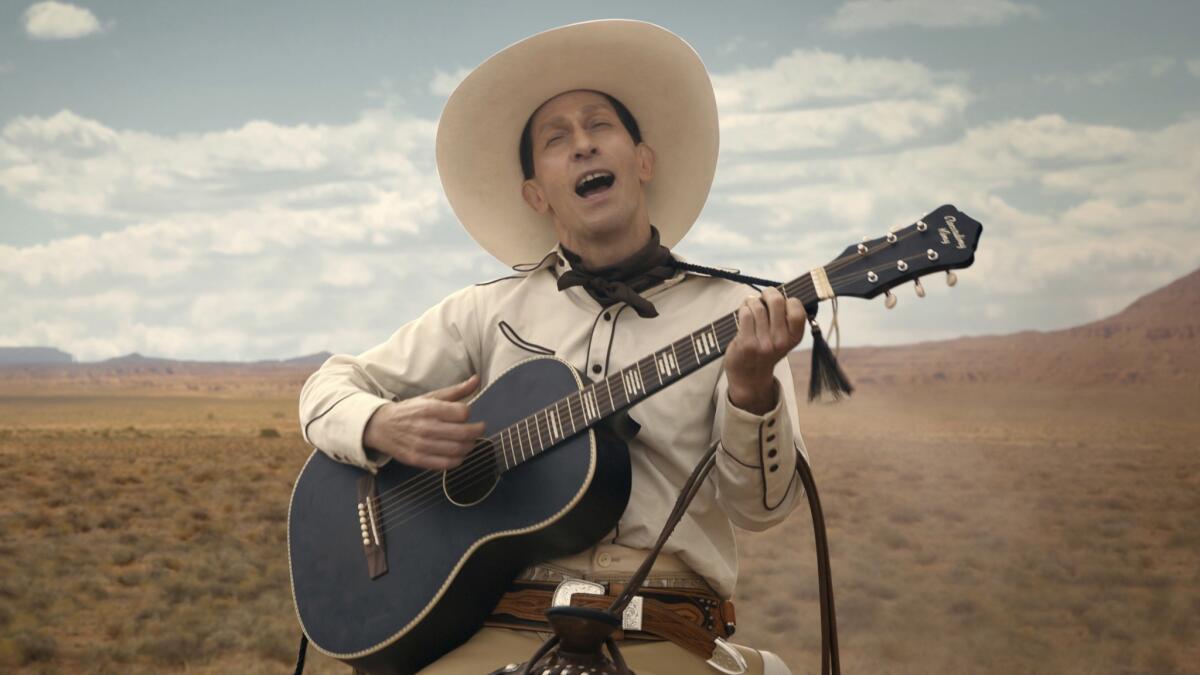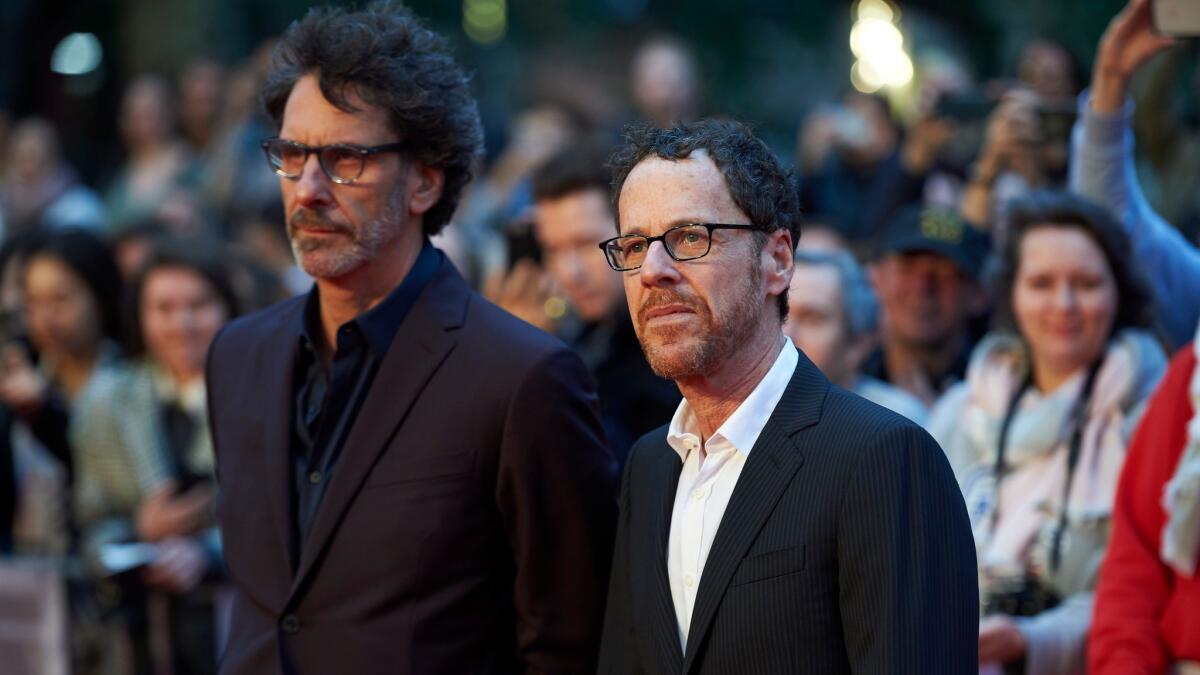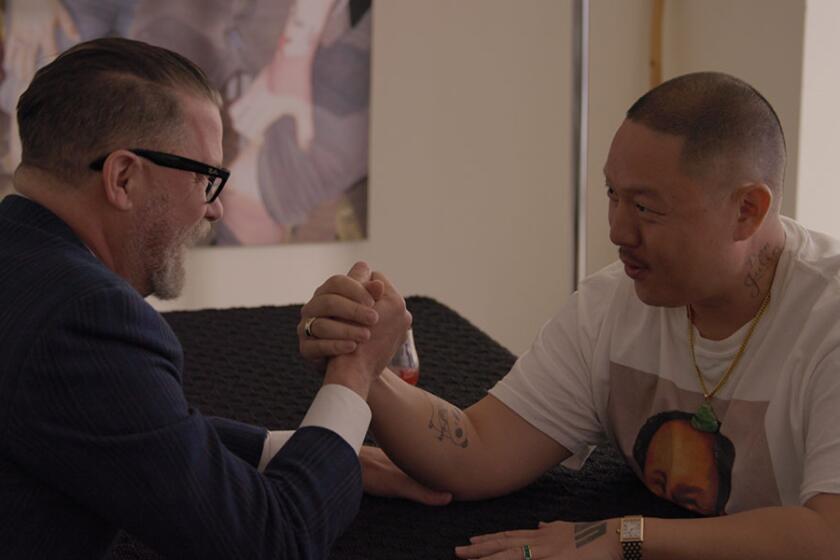The Coen brothers on their Western anthology film ‘The Ballad of Buster Scruggs,’ Netflix and the future of moviegoing

Throughout their careers, in much-loved films like “Raising Arizona,” “Fargo,” “The Big Lebowski” and “No Country for Old Men,” the directing duo of Joel and Ethan Coen have plumbed deep philosophical terrain — mortality, ethics, justice, existential despair — often with a twisted humor that’s all their own.
Scholarly essays have been written with titles like “Deceit, Desire, and Dark Comedy: Postmodern Dead Ends in ‘Blood Simple’ ” and “Postmodernity, Interpretation, and the Construction of History: Heidegger and the Problem of Interpretation in ‘Barton Fink.’ ”
But generally speaking, the Coens don’t much like to talk about all that.
“They’re of the school that the less that’s said regarding intentionality and overall thematic import, the better,” says Tim Blake Nelson, who plays the title character in the Coens’ latest effort, the western anthology film “The Ballad of Buster Scruggs.” “The script speaks for itself.”
That said, any opportunity to sit down with the Coens is not to be passed up, and with “Buster Scruggs,” there is plenty to talk about. Six short stories — by turns comic, somber and darkly surreal — all circling around questions of mortality, the film represents both a return to familiar Coen obsessions and a venture into new cinematic territory in terms of format and distribution. It’s playing in select theaters and will be available for streaming via Netflix on Friday.
The Times spoke with Joel, 63, and Ethan, 61, at the motion picture academy headquarters about how their “weird animal” of a film came together and their thoughts about Netflix and the state of filmgoing today.

You wrote the six stories that make up “Buster Scruggs” over a period of 25 years. What were you initially thinking you’d do with them? Was there any thought that any of them could be fleshed out into full-length features?
Ethan: No, we never thought of any of them as potential features or things that would grow into mature whole beings other than what they were. They were all written as shorts.
Joel: I don’t think we thought we’d make any of them actually. I mean, there isn’t really a market for them, so I think we just thought, “Well, it would be fun to make them, but how? And in what context?”
I assume you grew up watching Westerns, but were you also reading Western stories by people like Zane Grey and Jack London?
Ethan: Jack London, I guess, but not the sort of genre things. When you’re a kid in the Midwest in the ’60s, westerns are kind of not the thing — certainly not literature Westerns but even movie Westerns. I mean, John Wayne was pretty square at that point.
Joel: Yeah, with the exception of the Sergio Leone movies, which we saw when we were kids. Those sort of operatic spaghetti westerns we definitely did see, and I think it’s fair to say that [Leone’s 1969 film] “Once Upon a Time in the West” blew our minds to a certain extent. It’s a great movie and such a strange one that you can’t help but sit up and take notice.
There are a few themes that run through all of the stories in “Buster Scruggs” that have popped up throughout your career: death, criminality, whether the universe cares if bad things happen to good people. But when I talked to Tim Blake Nelson, he told me that when actors ask you about those deeper things, they’re generally met with “casual disdain or laughter.”
Joel: [Dryly] Yeah, we won’t talk to actors about it. We’re happy to talk to you about it, though.
Ethan: Well, I think Tim is misreading something as casual disdain when what we’re doing when he broaches that is going, “Oh, I never really thought about it that way!” [Laughs]
We like deeper things. We’re deeper-things enthusiasts! But we don’t think about our own movies in connection with each other. That’s kind of a critical exercise. It’s not our exercise.
So as you were starting to gather these stories together, did you consciously think about how they were thematically connected?
Ethan: Certainly at the point where we’d written three or four of them and thought we had almost enough to do as a feature, we started thinking consciously about what ties them together. And clearly that was death. Especially in the last one — the last story in the movie is the last one we wrote and we were thinking, “What is going to feel like a finishing thing for this group?”
Well, if you’re going to explore mortality, the Old West does seem like a good place to do it.
Ethan: Yeah, there are a lot of death opportunities.
Joel: Well, that’s true. Although, you know, throw a rock at any timeline and… [Laughs]
Did you take the project directly to Netflix?
Ethan: No, we took it to Annapurna actually and they agreed to finance it, and they quickly made a deal with Netflix shortly after that.
What was your feeling about working with Netflix? Obviously they’ve become the new 800-pound gorilla in the film business, but recently they’ve made a big push to work with major directors like you guys.
Joel: Our feeling was great, honestly. Look, they’re the people who are investing in these kinds of movies now. I mean, there’s a lot of discussion around the way the movies are shown, whether or not they have theatrical releases or just go up on the platform. And we both have opinions about that, and it’s an important discussion.
But I think the more fundamental thing is that they’re the people who are stepping up and spending money on movies that aren’t Marvel comic movies or big action franchise movies and that type of thing, which is pretty much the business of the studios now. We can’t argue with that.
Ethan: We never even went to a movie studio with it because we knew that a studio would never finance this.
Once Netflix came on, was there a discussion about chopping the stories up into some sort of series?
Joel: There was a discussion about what the format should be, but it was always the intention that they be seen together. There’s been all this stuff in the press about how it was originally a TV series and we restructured it. No, we had a script. The script is exactly what we gave Annapurna and exactly what we shot. That never changed.
You said that you have your own opinions about what Netflix means in the wider movie ecosystem. There are obviously people who see it as an existential threat to the traditional ways people have seen movies.
Joel: Probably it is. [Laughs]
But you’re OK with that, as long as the movies get made?
Ethan: Well, we’re conflicted like everybody. We go, “It’s great if people go see movies in theaters.” But then we go home and watch them on TV.
Joel: It’s true — “Oh, a screener!” [Laughs] In a strange way, Hollywood itself is as responsible for that as anyone else, at least amongst filmmakers. Because what they do is they give you all these DVDs of the movies that come out and instead of going to the movie theater, lazy people like us just plug them into our machines.
Ethan: But, you know, we started in the movie business because we had some success, to whatever degree we had it, because it was a point in the movie business when they were starting to make home videos. A lot of people saw our movies on home video. That’s always been the reality for us. It’s why we have a career, so we’re not going to start complaining about it now.
Joel: What you want is a mix of both, and it would be great if this was where it lands eventually. In terms of the actual labor you put into making a movie — the hours and days and years you spend struggling over details and the sound and the way it looks and the whole thing — that really is appreciated in a different way on a big screen.
There also is something really fundamental about having the chance to see movies in a community of strangers, not just your friends in your living room. You don’t want that to go away. So in that respect, no, I wouldn’t be happy if the only way you could see movies was on your television.
Watching “Buster Scruggs” does make you wonder if you guys would ever do some kind of TV series. Have you thought about that?
Joel: The thing about TV series that I don’t understand and I think is hard for both of us to get our minds around is, you know, feature films have a beginning, a middle and an end. But open-ended stories have a beginning and a middle — and then they’re beaten to death until they’re exhausted and die. They don’t actually have an end. And thinking about that in the context of a story is rather alien to the way we imagine these things.
As kids, we watched open-ended series. But as adults, I don’t. Like, “Petticoat Junction” — that’s when I stopped watching series. [Laughs]
With this movie, you were essentially making six films in one, with six pre-productions, six times figuring out things like wardrobe and score, six edits. Do you think you could have undertaken something like this at an earlier point in your careers?
Ethan: Well, it was schizophrenic. It was a weird mental exercise and mentally stressful in that way. It would definitely have been impossible to make as a first movie or a second movie.
Joel: We’ve been working with the same people for decades and at this point that’s so easy and they’re all so great that you have a kind of machine that you’re making the movie with. That’s certainly helpful and that’s something we didn’t have early on because it takes a while to develop a group of people.
But in another respect, it was a very difficult movie to make physically. It was just all exteriors in really brutal weather, no cover sets, multiple locations all over, a lot of traveling. It wouldn’t have hurt if we were younger. [Laughs]
This interview has been condensed and edited.
Twitter: @joshrottenberg
More to Read
Only good movies
Get the Indie Focus newsletter, Mark Olsen's weekly guide to the world of cinema.
You may occasionally receive promotional content from the Los Angeles Times.











